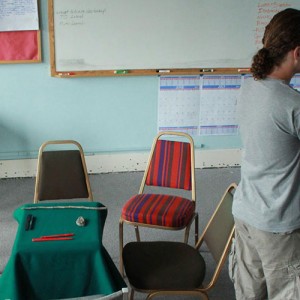62 minutes and 37 seconds.
Recorded July 25th, 2011
Our discussion over dinner involves accents, talk of facilitation issues and how important it is to have a strong healthy community in order for a language to survive. We question which comes first; the language hunter, or the language teacher. This question goes hand in hand with, are we saving a language or building a community? A new TQ is born, the Hunting license, and we talk about how the kids check out during talks and together we brainstorm an alternative to get messages across without the discussions feeling like lectures.
7:16 – Are we saving a language or are we saving a community?
April questions Evan what the group needs to be focusing on, language or community. Sky follows with, “what comes first, the language hunter or language teacher?”
10:16 – TQ: Teach it Off
Evan shares his vision of how the teaching process should work.
12:06 – Language Hunter vs. Teacher
Sky answers the question of are whether we are training teachers or hunters.
15:06 – Facilitation
Discussion turns back to the idea of pulling the kids into the facilitation part of this program. April shares her feelings on her disappointment for not having the ORID happen because the kids are having a conflict and it’s not being resolved. If they were helping with the facilitation they could help with ideas on resolving the issues.
19:38 -Panda Analogy
David Edwards compares saving a dying language to trying to save a dying Panda.
23:03 – Dealing with the conflict
Evan and April talk about how important it is to work out the conflict and get the community/family back on track. The plan get the kids refocused is eluded too which includes asking them “Why are you here?” and “What are you going to do today to help accelerate the learning of Numu?”
24:10 – Alternative to Lectures
Recognizing that the kids aren’t trained adults who can sit through three hour classes and so we need to devise a plan to get across important information without it feeling like a lecture.
26:40 – Laboratory
April brings up the idea of having clipboards and pencils to observe the hunts. David discusses what he needs to do during the TQ Sportscaster.
28:11 – Pairing WAYK and Healthy Native Community Fellowship tools
April discusses her idea of combining buckets and the facilitation tool Boldest Idea.
31:04 – Finalized Laboratory Plan
35:45 – Hunting
Sky brings up the point that we are having all the kids learn how to hunt and while some of them are good at it, for others it’s the other way around. The discussion turns to Evan explaining that the game shifts when someone is hunting and pushing the language.
39:00- TQ: Grandma Hunting License
David is shocked to learn that he is now Chuck Norris. As Chuck Norris, David would help guide the hunting. This leads to the contract of the TQ Grandma Hunting License.
47:10 – Next Time
Evan shares what he would do the next time he runs a program in dealing with hunting nouns. Evan shares how much mileage he was able to get from using a huge glass at the Latin Language Conference. Realizing that jumping from hunting nouns to hunting glue words was a TQ Sorry Charlie for the kids.
53:26 – Finding the Structure in Languages
David shares that he and Evan know that the goal of hunting is to find the structure in language but the kids don’t know what that means.
55:30 – Extreme Barter!!
David shares his idea of having a huge want, have, give, take, exchange which leads to the Extreme Barter plan.





You guys are talking about “rides” a lot. Is there a description of this term in a podcast, blog post, or the wiki?
I don’t know if there is, but here’s a little explanation.
It’s basically a bite size piece of language that requires a particular set-up when teaching that piece of language off.
The shorthand term of “ride” came about after Evan told us his Disneyland analogy to describe the process of teaching, or pushing language. Like starting at the Tea Cup ride and growing up to, (learning your way up to) Space Mountain or some other ride that you may not have been tall enough (fluent enough) to ride in the beginning.
Also, it leads into the technique: “I’m not tall enough for this ride,” which is an extension of Sorry Charlie but is a way for the player to call it on themself and gives the teacher a way of quickly assessing where the player is in the language.
Thanks for the question, in future podcasts we’ll keep an eye out for and describe terms that aren’t well described.
Thanks Sky, that helps. Is “What’s that?” a ride, and “Who’s is that?” another ride? Or is What, who, want/have/give/take all one ride?
With Numu each bite sized piece is its own ride. If it requires a new set-up, it’s a new ride. “Ishu/Mashu/Ushu” is our “What is that” ride that explains the spatial and proximal distances that we’ve encountered and that in turn leads into a whole other “what is that” ride with a new set-up that explains it even further. Want/have/give/take are their own separate rides and each of those rides branch off into more rides and deal with specific issues that come up when playing through the game.
Really interesting to me that in these last couple podcasts it sounds like you guys have hit on the microtransaction/achievement model that has worked for so many MMOs. And you’ve found a way to use the Pyramid Scheme for good.
Oberonthefool, could you elaborate?